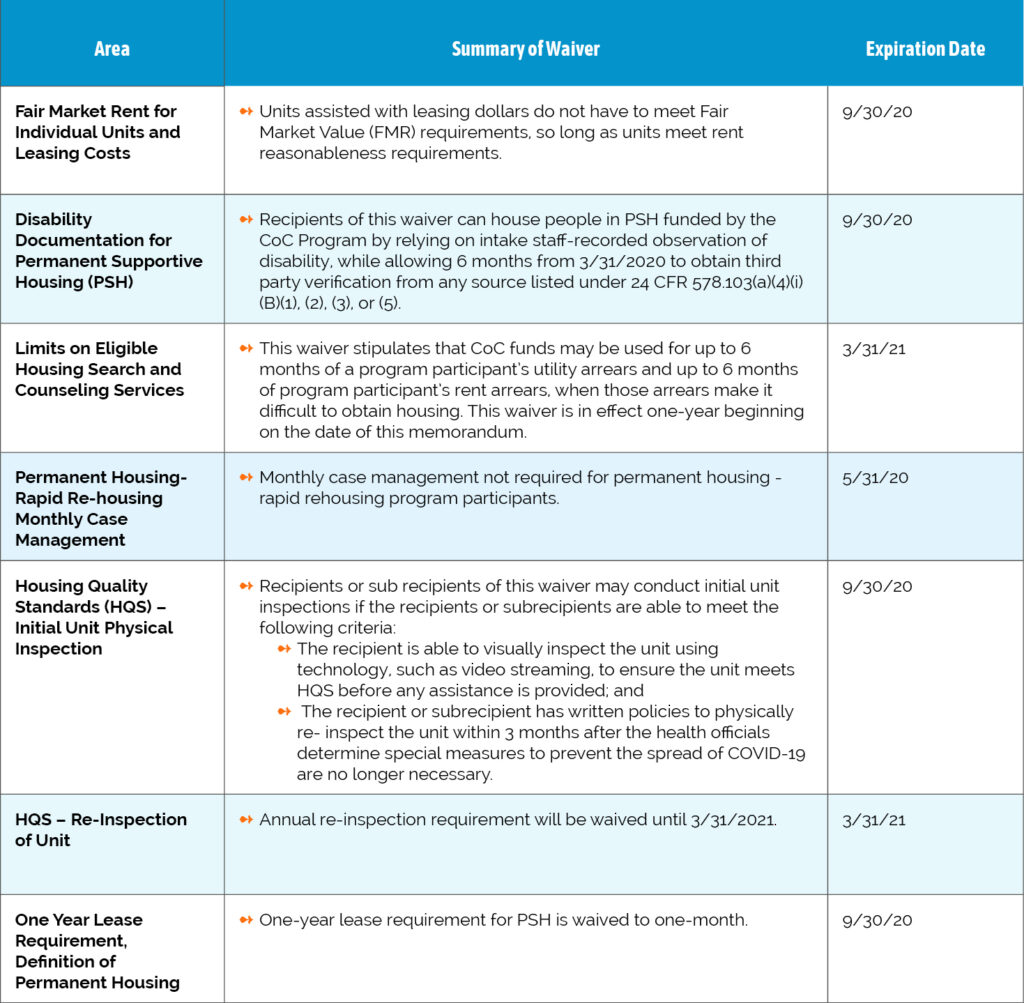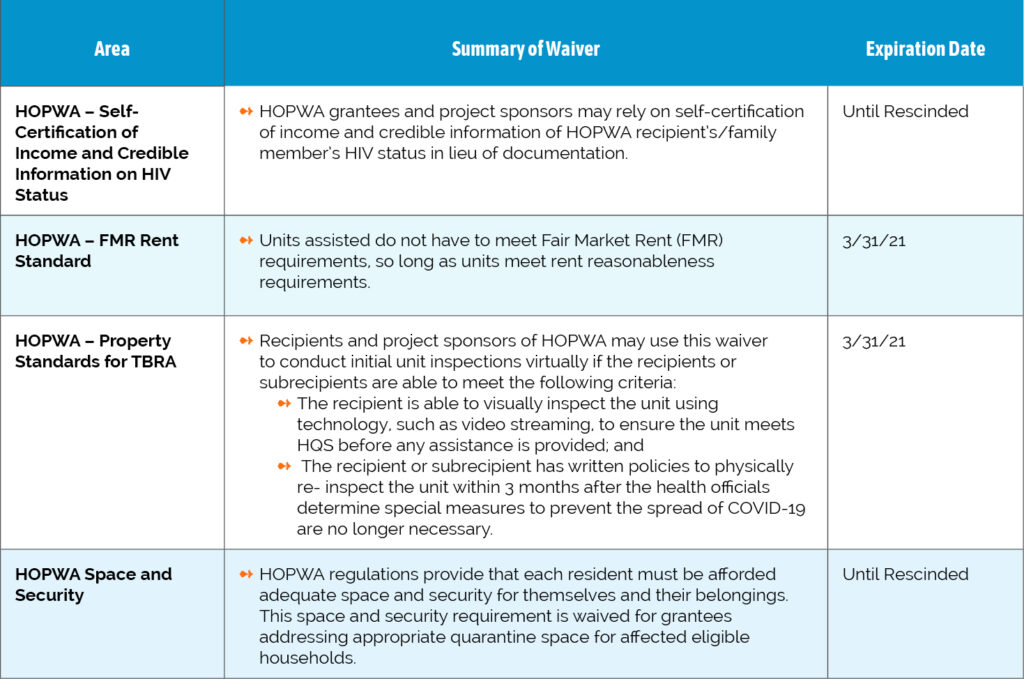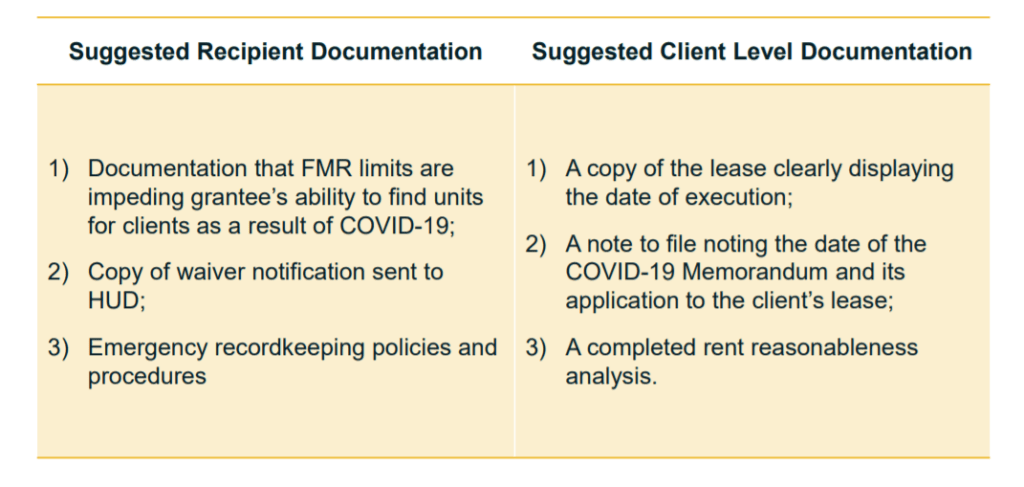CoC/ESG/HOPWA Regulatory Waiver Guidance
April 28, 2020On April 1, HUD issued “regulatory waivers” of a number of requirements for the Continuum of Care (CoC), Emergency Solutions Grants (ESG), and Housing for Persons With AIDS (HOPWA) programs in order to give communities more flexibility to both prevent the spread of COVID-19 and to provide direct support to people who are impacted by COVID-19.
This document is designed to get you started with information about what the waivers do and how to use them. Please note that this set of regulatory waivers is different from the PIH waiver HUD issued on April 10. For introductory guidance on that document, please click here.
For more comprehensive resources on the April 1 (CoC/ESG/HOPWA) waiver, you can:
- Review the slides from HUD’s recent regulatory waiver webinar
- Watch the video from the same webinar (for all you auditory learners)
- Read the longer explanatory memo that the webinar was based on
Sources:
- HUD: April 1 Regulatory Waiver Announcement
- HUD: April 1 Regulatory Waiver Webinar – Overview
- HUD: April 1 Regulatory Waiver Webinar – Slides
- HUD: April 1 Regulatory Waiver Webinar – Recording
- HUD: April 1 Regulatory Waiver Explanatory Memo
Last Updated April 28, 2020
What programs and program requirements does the April 1 HUD regulatory waiver cover?
The April 1 HUD regulatory waiver covers the CoC, ESG, and HOPWA programs. In the table below, we summarize individual waivers. Communities can adopt some, all, or none of the waivers at their discretion. More info on how to do so is in the next section of this document.
For more detail on any of the individual waivers, we again recommend the slides from HUD’s recent regulatory waiver webinar. The information below is intended solely as a high-level summary, for which we are indebted in part to excellent notes from Detroit.
The HUD regulatory waivers cover the following CoC program areas:

For the ESG program, the regulatory waivers cover the following areas:

For the HOPWA program, the regulatory waivers cover the following areas:

The HUD regulatory waivers also covers the following consolidated community plan requirements:

Sources:
- HUD: Regulatory Waiver Webinar – Overview
- HUD: Regulatory Waiver Webinar – Slides
- Detroit CoC: Summary and Sample Email
What do I do if I would like to use the waivers?
Once you’ve decided which waivers you’d like to use, you’ll need to:
- Notify the Community Planning & Development (CPD) director at your local HUD field office by email at least two days before you anticipate using the flexibility it grants.
- HUD has provided a list of CPD Director emails for you to use when you reach out. You must use these emails, not any existing contact info you have for CPD Directors.
- Detroit has produced an excellent sample email and template.
- Housing Innovations has created several excellent examples: here is a sample waiver, sample policy, and sample process for waivers.
Sources
- HUD: List of CPD Director Contact Information
- Detroit CoC: Summary and Sample Email
- Housing Innovations: Sample Waiver Template
- Housing Innovations: Sample Policy
- Housing Innovations: Sample Process for Waivers
What documentation or other info do I need to collect when I’m using the waivers?
You don’t need to provide any documentation to begin using the waivers, but HUD has established information gathering requirements for actually using each waiver, which are spelled out in the slides from HUD’s regulatory waiver webinar and the accompanying memo.
For example, even with waiver for the “Fair Market Rent (FMR) for Individual Units and Leasing Costs” requirement, HUD still requires that rent payments for individual units with leasing dollars must meet the “rent reasonableness” standard. We recommend that you use ctrl-F in the memo document to find the requirements for the waivers you plan to apply for.
In addition, HUD strongly recommends (but does not require) that you:
- Establish a set of emergency policies and procedures to govern your use of the flexibility granted by the waivers, and
- Explain what kind of data you’ll collect about how you’re using them.
The slides from HUD’s regulatory waiver webinar spell out suggested documentation to collect for each waiver. For example, for the FMR rule:

Sources
- null
- HUD: Regulatory Waiver Webinar – Overview
- HUD: Regulatory Waiver Webinar – Slides
- HUD: Regulatory Waiver Explanatory Memo
Are there any other resources available to help me use the HUD regulatory waiver?
For specific, bounded questions about what’s allowed, your best best is to use the HUD Ask A Question (AAQ) portal. HUD triages AAQ questions pretty quickly to expert TA providers (often the same folks who provide on-the-ground TA), and you’ll typically get a response within 3-5 business days (maybe a little longer these days).
Sources:
QUALITY CHECK
Learn more about our process for vetting information.


